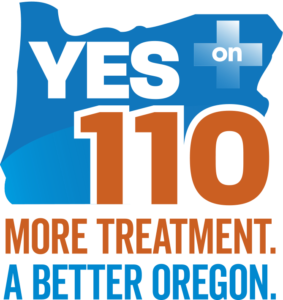
Drug treatment and decrim measure officially certified for Oregon ballot
Oregonians will vote on Measure 110 in November
Oregon voters will decide in November whether to expand access to drug addiction treatment and reduce criminal penalties for simple drug possession, the Oregon Secretary of State officially confirmed today.
The Drug Addiction Treatment and Recovery Act has been officially certified as Ballot Measure number 110. Measure 110 would expand access around the state to drug addiction treatment and recovery services, paid for with a portion of taxes from legal marijuana sales. About one in 10 adults in Oregon need treatment for substance use disorder but have not received it, according to the federal government.
Measure 110 does not legalize drugs. Rather, it decriminalizes small amounts of drug possession as part of a shift to a health-based approach to addiction.
According to an independent released by the Oregon Secretary of State and conducted by the Oregon Criminal Justice Commission, Measure 110 would nearly eliminate racial disparities in drug arrests and convictions. For example, disparities in drug arrests would drop by 95%. About 8,900 people in Oregon are arrested in cases where drugs are the most serious offense, which is the equivalent of one arrest every hour
- Click here to see how Measure 110 works
- Click here to read the Secretary of State’s official short description of Measure 110
- Click here to read Measure 110
The chief petitioners of the Yes on 110 campaign are Janie Gullickson, executive director of the Mental Health and Addiction Association of Oregon; Haven Wheelock, a harm reduction specialist at OutsideIn; and Anthony Johnson, a longtime drug reform advocate who was a leader of the Measure 91 campaign to legalize marijuana.
The More Treatment Campaign, soon to be called the Yes on 110 campaign, has been endorsed by more than 75 organizations, including Central City Concern, one of the oldest and largest treatment organizations in Oregon; the Coalition of Communities of Color, which represents 19 culturally-specific community-based organizations; and the Alano Club, the oldest and largest recovery organization in Oregon.
The campaign does not face an organized opposition. “But what we are up against are the stereotypes and misinformation from the War on Drugs,” said campaign manager Peter Zuckerman, “so we are going to fight for every vote and make our case to as many people as possible.”
Visuals and media:
- , and feel free to use anything on our .
Reporting notes and resources
- A . The report was released by the Oregon Secretary of State and conducted by the Oregon Criminal Justice Commission, both of which are government agencies separate from the campaign. There are two versions: The short one that will appear in the voter pamphlet and the long one that explains the short one. If you need to get the reports officially emailed to you from the Oregon Secretary of State, their number is .
- How to write about addiction without promoting stigma and bias: 4 tips for journalists
- The Secretary of State’s official description of the initiative.
- Organizations and individuals who support the initiative.
- The initiative itself.
Background facts:
- About 8,900 Oregonians are arrested every year in cases where simple drug possession is the most serious offense, according to the latest numbers from the Oregon Criminal Justice Commission. That’s like one arrest an hour, or arresting roughly the population of Molalla every year.
- About one in 10 adults in Oregon need treatment for substance use disorder but have not received it, according to the federal government.
- Oregon ranks near last in terms of people who need treatment but can’t get it, according to the federal government.
###

